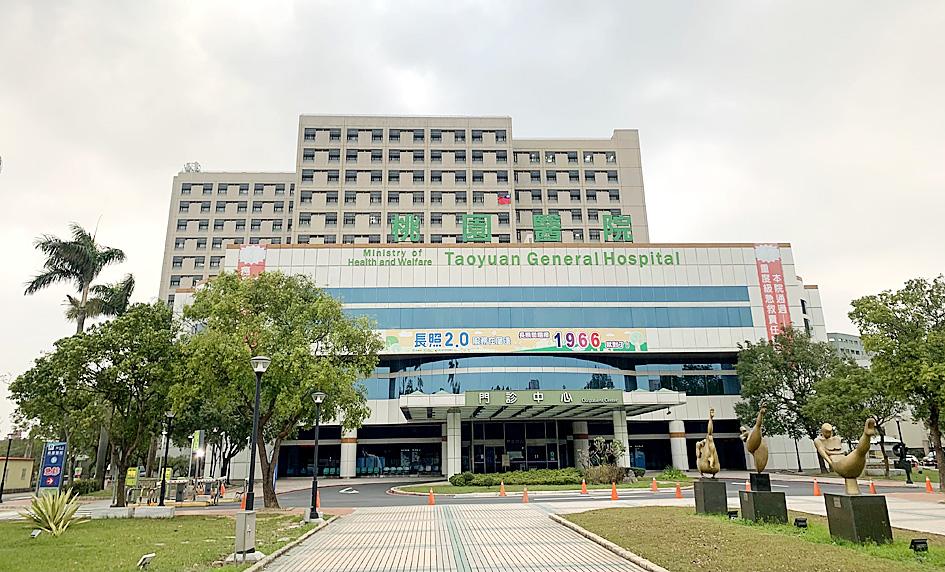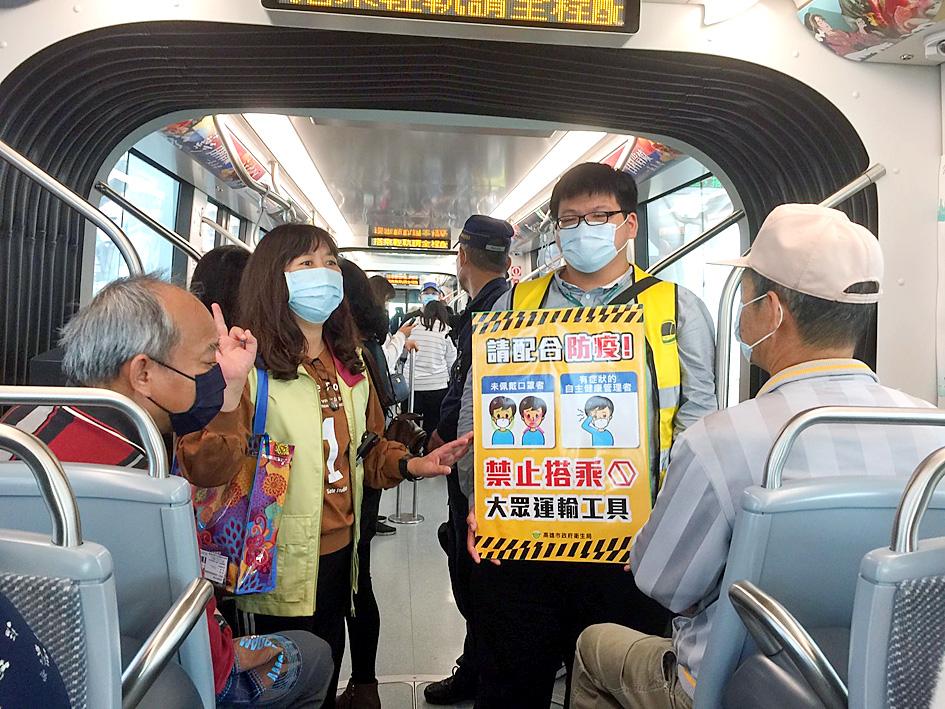The Central Epidemic Command Center (CECC) announced an emergency expanded isolation order last night, effective immediately, after earlier reporting two more COVID-19 cases associated with a cluster infection at Taoyuan General Hospital.
Minister of Health and Welfare Chen Shih-chung (陳時中), who heads the center, said that one of the new cases is a man in his 60s (case No. 889), who was admitted to the hospital from Jan. 8 to Jan. 11.
The man had a rash between Jan. 16 and Monday last week, and developed symptoms including chills and tiredness on Wednesday.

Photo: Chen En-hui, Taipei Times
He sought treatment for another condition on Friday, and was isolated and tested because he had a fever, and the result came back positive yesterday, Chen said.
The other case (No. 890), a woman in her 60s, is a family member of case No. 889 and took care of him when he was hospitalized, he said.
She began experiencing a sore throat on Wednesday and a fever on Friday, at which point she was tested, Chen said.

Photo courtesy of Department of Health, Kaohsiung City Government
Chen said that case No. 889 was in ward 12A on the 12th floor, which initially had been considered a “green zone” with a relatively low risk of COVID-19 infection, so both new cases had only been placed under self-health management.
While contact tracing is being conducted to clarify the possible infection source, the center yesterday afternoon listed the 12th floor as a “red zone” with a high risk of infection, Chen said, adding that expanded polymerase chain reaction (PCR) testing or even serological antibody testing would be considered if the infection source could not be identified.
However, the center at 6:30pm called an emergency news conference at which it announced expanded isolation measures.
“We need to build a better firewall at this critical moment, although it may affect many people,” Chen said.
The whole hospital building would be treated as a red zone, Chen said.
All patients who were discharged between Jan. 6 and Tuesday last week, as well as people living with them and their caregivers, would be traced and placed under household isolation, he said.
“We recognized that we have no time to wait for the results of further PCR and antibody tests, so we rather took action fast to reduce the risk of community infection,” he said.
Chen said that three categories of people associated with the hospital between Jan. 6 and Tuesday would be placed under home isolation immediately: patients who have been discharged and people living in the same home as them; caregivers of hospitalized patients and people living in the same home as them; and people who were exposed to case No. 889 when he sought medical treatment.
Starting from 6:30pm yesterday, they would be subject to 14-day home isolation starting from the day they were discharged from the hospital, mandatory testing upon ending isolation, and an additional seven days of self-health management, he said.
The hospital’s employees and people who sought treatment at the hospital’s outpatient departments or emergency room after Jan. 6 are required to practice self-health management, Chen said, adding that they were to be informed one by one beginning shortly after 6:30pm.
As the caregivers or family members who accompanied patients are more difficult to identify, discharged patients would be contacted to try and identify the people who visited them in hospital, as well as those they are living with, Chen said.
More than 5,000 people could be placed under isolation, he added.
The centers also reported three imported cases yesterday: a person who returned from South Africa and two people who returned from the US.

Conflict with Taiwan could leave China with “massive economic disruption, catastrophic military losses, significant social unrest, and devastating sanctions,” a US think tank said in a report released on Monday. The German Marshall Fund released a report titled If China Attacks Taiwan: The Consequences for China of “Minor Conflict” and “Major War” Scenarios. The report details the “massive” economic, military, social and international costs to China in the event of a minor conflict or major war with Taiwan, estimating that the Chinese People’s Liberation Army (PLA) could sustain losses of more than half of its active-duty ground forces, including 100,000 troops. Understanding Chinese

The Ministry of Foreign Affairs (MOFA) yesterday said it is closely monitoring developments in Venezuela, and would continue to cooperate with democratic allies and work together for regional and global security, stability, and prosperity. The remarks came after the US on Saturday launched a series of airstrikes in Venezuela and kidnapped Venezuelan President Nicolas Maduro, who was later flown to New York along with his wife. The pair face US charges related to drug trafficking and alleged cooperation with gangs designated as terrorist organizations. Maduro has denied the allegations. The ministry said that it is closely monitoring the political and economic situation

UNRELENTING: China attempted cyberattacks on Taiwan’s critical infrastructure 2.63 million times per day last year, up from 1.23 million in 2023, the NSB said China’s cyberarmy has long engaged in cyberattacks against Taiwan’s critical infrastructure, employing diverse and evolving tactics, the National Security Bureau (NSB) said yesterday, adding that cyberattacks on critical energy infrastructure last year increased 10-fold compared with the previous year. The NSB yesterday released a report titled Analysis on China’s Cyber Threats to Taiwan’s Critical Infrastructure in 2025, outlining the number of cyberattacks, major tactics and hacker groups. Taiwan’s national intelligence community identified a large number of cybersecurity incidents last year, the bureau said in a statement. China’s cyberarmy last year launched an average of 2.63 million intrusion attempts per day targeting Taiwan’s critical

‘SLICING METHOD’: In the event of a blockade, the China Coast Guard would intercept Taiwanese ships while its navy would seek to deter foreign intervention China’s military drills around Taiwan this week signaled potential strategies to cut the nation off from energy supplies and foreign military assistance, a US think tank report said. The Chinese People’s Liberation Army (PLA) conducted what it called “Justice Mission 2025” exercises from Monday to Tuesday in five maritime zones and airspace around Taiwan, calling them a warning to “Taiwanese independence” forces. In a report released on Wednesday, the Institute for the Study of War said the exercises effectively simulated blocking shipping routes to major port cities, including Kaohsiung, Keelung and Hualien. Taiwan would be highly vulnerable under such a blockade, because it